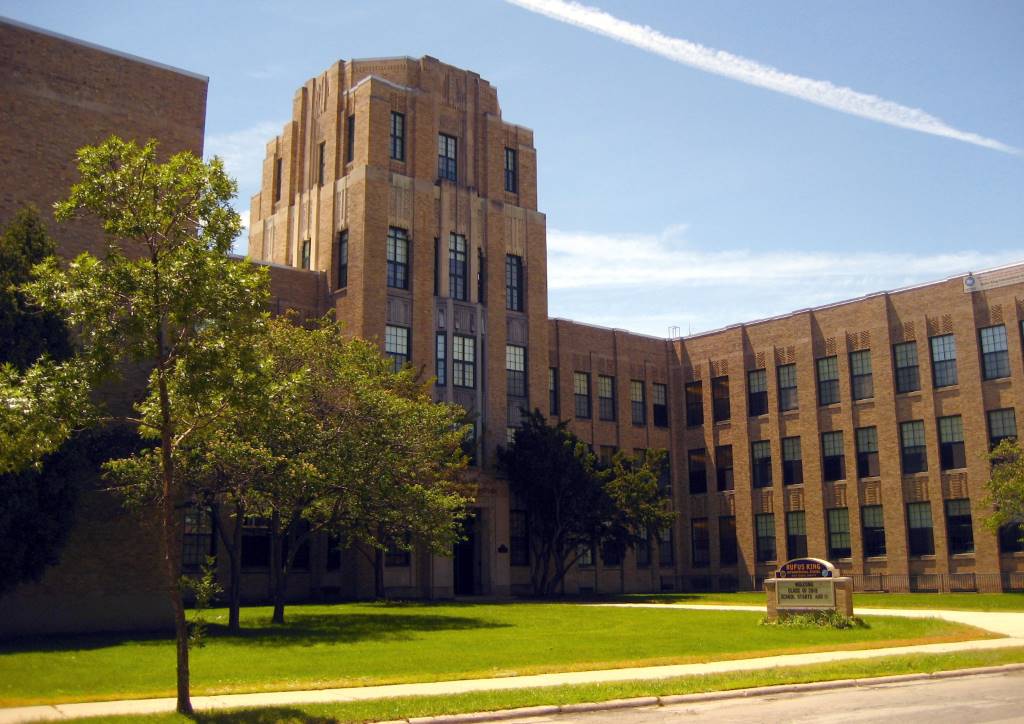New Study Shows Teacher Shortage
The problem exists statewide, but is the worst in metro Milwaukee.
Back in August, Urban Milwaukee did a story documenting the growing teacher shortage in Wisconsin, which found many school districts were having trouble attracting teacher applicants and many universities were seeing a decline in education majors, led by UW-Milwaukee, with a 23 percent decline.
A new study by the Public Policy Forum shows the problem is both worse — and not as bad — as earlier reports have shown. Wisconsin is definitely seeing a decline in education students in colleges: that has declined by 28 percent from 2008-2009 to 2013-2014, but the national decline has been even higher: 35 percent during that period. State-wide, UW-Oshkosh saw the steepest decline — 70 percent — in its teacher preparation program enrollees.
Wisconsin also saw a 7 percent decline of education majors completing their teacher training during that period, compared to a 22 percent decline nationally. “It is clear that the decline in enrollment in teacher preparation programs that our state has experienced in recent years is part of a larger regional and national trend impacting the teaching profession,” the study notes.
Yet this problem has been compounded by the impact of Act 10, which greatly increased the number of teachers leaving the profession. “The data show a clear spike in teachers leaving after the 2010-11 school year. This corresponds to the time when Wisconsin Act 10 was proposed and adopted,” the study notes. State-wide, 6,507 teachers retired in the year after Act 10 was passed, a 56 percent increase over the prior year, when just 4,173 left the profession. Many of those leaving in both years were retiring.
The study documented a huge problem in metro Milwaukee: “Teachers age 55 and above – who are eligible for retirement – represent 46.7% of teachers who leave. However, this means 53.3% of the teachers who leave are doing so prior to retirement. Young teachers in their 20s and 30s comprise 34% of those who leave the profession. This suggests that public school districts in the state have difficulty retaining young teachers.”
Why are so many teachers leaving the profession? “Survey respondents listed money as the most frequent reason. From low starting salaries, to capped raises, to a lack of opportunity for income growth, teachers indicate they seek higher earnings beyond the classroom.”
This finding reinforces what officials with the Milwaukee teachers union had long argued, that the prospect of future “step” raises and pension plans helped the school district to retain younger teachers.
The increase in teachers leaving the profession has meant a decline in experienced teachers state-wide, the study found. “Teachers with no prior experience comprised 44.5% of entering teachers in 2010-11, but grew to 62.3% in 2013-14. Moreover, those with more than 10 years of experience declined from 21.7% of entering teachers to 13.7% over the same period. “
The problem could worsen, it the years to come, the study suggested, particularly in metro Milwaukee, where about 27 percent of the workforce “has reached the minimum retirement age of 55 or will do so in the next few years.”
Meanwhile, younger teachers who leave the profession to have children or for other reasons are now less likely to come back: “returning teachers with more than five years of experience comprised 37.4% of entering teachers in 2009-10; by 2013-14, however, they accounted for 24.5%. This may be an indication that fewer people want to return to the profession after they have initially left the teacher workforce.”
This “places increased importance on the supply from teacher preparation programs,” the study noted, but “fewer people in recent years are enrolling in those programs.”
Not only are there fewer education majors in Wisconsin, there are fewer teacher applicants coming here from other states: “In recent years, about 1,800 initial teaching licenses were granted each year to people who completed a prep program in another state. In the most recent year, however, that number fell to 934, a decrease of 49%,” the study found.
Nationally, the teaching profession has an average starting salary of $30,377, while the average starting salary for all college graduates was $45,473. The loss of compensation and prestige for teachers in Wisconsin, as a result of Act 10, may have only compounded that problem.
The Policy Policy Forum study proposes a list of policy options to ease the teacher shortage “and bolster the profession,” including:
-Promise programs that assist with college costs and incentivize people to become educators;
-Expansion of existing state and federal teacher loan forgiveness programs;
-A debt assistance program that helps educators to pay off student loans while teaching;
-Changes to teacher salaries, including raises and performance-based compensation;
-Part-time teacher employment to accommodate family obligations while boosting retention.
Back in the News
-
Justice Ziegler Misquotes US Supreme Court Decision
 Dec 2nd, 2025 by Bruce Murphy
Dec 2nd, 2025 by Bruce Murphy
-
Will West Milwaukee Do Development Near Brewers Stadium?
 Dec 1st, 2025 by Bruce Murphy
Dec 1st, 2025 by Bruce Murphy
-
Key Streetcar Opponent Opposes Effort to Shut It Down
 Nov 10th, 2025 by Bruce Murphy
Nov 10th, 2025 by Bruce Murphy























However you feel about ACT 10 and whether or not you believe it is the cause, this study proves that the problem is serious. More teachers are leaving the profession and at the same time less people are enrolling in teacher preparation programs. That should seriously concern everyone whatever their political persuasion is.
More importantly, are we having difficulty filling teacher positions (other than the STEM and special ed positions we’ve always had trouble filling). Wisconsin has always had more teacher applicants than we did openings and the rash of ACT10 early retirements won’t last, is this actually a good thing for people who want to be teachers? Can they finally have an easier time getting the jobs they want? Will MPS and other districts be able to fill the positions with quality candidates?
Joe Yaedo, one of the authors of the study, said to the biztimes, “What we’re finding is that districts in metro Milwaukee are doing a pretty good job filling the gaps, but their continued ability to do so hinges on a steady stable supply of new teacher.”
Trends are less important than the outcome and ability to meet demand. My position on what we should do, if anything, is dependent on that.
No it is not a good thing. MPS already has a hard time finding quality candidates. The rash of Act 10 retirements might not last, but there will also be a rash of teachers who are in their 50s or 60s retiring. If we don’t have as many people in teacher prep programs, that’s a problem. Less people in the profession hardly means there will be more quality teachers. AG you are always so desperate to put a positive spin on this or insist that there’s an upside, but this report makes that really hard to do.
We previously had an oversupply of non-STEM and special ed teachers… we now have less supply. Is it too little or more at an equilibrium? I don’t see hard data showing us the answer to that. Do you have data that shows us that?
I’m not trying to be overly rosey, I want to know the details before I form my opinion. Once we know that, we can look at things like increasing base pay, changing how raises are dolled out, and perhaps raising retirement qualification age.
Waiting for more details isn’t going to address the issue. I’m not sure how less teachers (and less competition) can be a good thing for schools or the field of education in general. Would say Johnson Controls not be concerned if suddenly there was a 30% drop in people getting engineering degrees? I bet they would be very concerned and rightly so.
You don’t think it’s important to know if we are at a good level or not before making decisions on how to act?
Of course a bigger talent pool is what the school districts want. If we can work our way back to where we were with an oversupply of potential teachers then the districts can have their pick of the litter and pay them less. That doesn’t mean it’s what is best for the education system and the community when we have a lot of unemployed wanna-be teachers.
However you define good level AG, no, I don’t think it’s wise to wait at this point. We know that teacher turnover has risen significantly and we know that a very large number of Baby Boomer teachers will be retiring soon and we know that teacher prep programs have experienced a huge decline. Collectively that is cause for major concern. I’d say major concern means doing something sooner rather than later and waiting around to see if we’re at a “good level.”
I know it’s almost impossible to quantify, but sure not hard to ignore, but I have to wonder what effect the constant bashing of those in the field by right-wing radio, conservative politicians, and choice advocates has had. Many of us in education simply don’t tell others what we do and even warn, and discourage, those kids who have expressed interest in teaching.
There is simply too narrow a focus…the teacher. Student abilities, home situations, local economics all are cogs in the machine. It’s punish to improve, not rallying the troops that rules the age.
Years of “education reform” hasn’t produced much improvement, elimination of requirements does the same, and just a simple slashing of funding all appear to have been detrimental…yet, it’s still a mystery. Weird.
SteveM, do you actually have people bash you and your profession to your face in settings that are not protests? I’m not saying it doesn’t happen, but knowing probably half or over half of my social circle are probably more conservative, I don’t see any of them doing that and in fact love and appreciate their children’s teachers.
I’ve seen more issues made by my left of center friends talking about how unappreciated teachers are by the right then right of center friends actually express. You may be turning off future teachers who, by the time they actually go to school for it, won’t see all the turmoil that a few political extremes on both sides have stirred up.
Vincent, what if we up the retirement age to 62? That could keep good quality teachers in the classroom longer to help mentor this younger generation of teachers.
Yes, AG, I am an educator who has had people — especially parents, but also politicians and others — bash me and my profession to my face. And half a dozen of my family members, including some of my siblings as well as two nieces and my own daughter, who are teachers in Wisconsin, in half a dozen school districts (none of them in Milwaukee) also have experienced this.
Those of us in the older generation did not experience this until 2011. Sadly, two of the nieces now are considering leaving the profession, owing to the lack of support from administrators and school boards as well as parents and politicians.
I’m very sad to hear that happened. There are crazies in all walks of life and of all beliefs, don’t let these particular ones get to you or discourage your nieces from an admirable career. Most importantly, remember that the vast majority of parents and those in the community appreciate you! Thank you for what you do!
The Bureau of Labor Statistics predicted a need for 500,000 new teachers between 2008-2018. The needs differ widely between cities and states but small towns and urban areas see a greater need than suburban areas. However, the most severe demand across the nation is for; Bilingual/ESL, Math, Science, Foreign Language and Special Education Teachers. Some districts are offering uncommon perks and benefits to attract potential teachers, such as, signing bonuses, housing assistance, moving expenses, on-site childcare, continuing ed coursework, and a few even removing residency requirements and promises to help reduce student loan debt after 3-5 years with the district. The destination districts in the metro area, especially the high performing and higher paying, are flush with applicants. As a graduate level instructor of teachers from public, private and charter schools in MKE, Racine, Kenosha and Waukesha, I hear more from teachers exploring other careers now. Reasons; administration is only half of what it should be in terms of evaluation related to pay for performance, school boards are uninformed & ill-informed about what happens in the classroom and they can make more money for the same amount of work in another profession. Act 10 has become more of a message than an argument; the message is don’t go into education.
Mike, well said. The two nieces who are thinking of giving up are giving 60 hours a week and more to their schools — one in a Washington County district and one in a Dane County district — with coaching and other extracurriculars in addition to increased classloads and decreased prep time are paid $36,000 for high-school teaching and $39,000 for grade-school teaching, suggesting the disparities among districts, despite different levels of preparation and greater requirements for continued education for the lesser-paid, small-town teachers. And their administrators cannot work with unions anymore to simplify problems with working conditions aka classroom conditions for students; each teacher has to do so, separately, which adds immeasurably to the workload of administrators, too. I wonder how many of them may be giving up soon.
By contrast, my daughter is in a school district well known for its good treatment of teachers, in a suburb of Milwaukee, where she also teaches at the elementary level but is paid many thousands more than is her cousin at the high-school level. The administrators at my daughter’s school district work cooperatively and respectfully with teachers — and they have unofficial reps to do so, pre-Act 10 style. And the school board in her district just voted that all teachers by their fifth year ought to be salaried at $50,000. The benefits also are better than elsewhere, as well my daughter knows, having had to leave a district that was disrespectful of teachers (including her, an award-winning teacher in only her first year there). So, she is not considering leaving the profession, and her district has no difficulty finding teachers. Go figure.
I have four teachers in my family – one elementary, one middle school, one ESL, and one bi-lingual. In one breath my ultra-conservative family brags on them and says how wonderful it is that they teach….then in another breath blasts “those union loving money grabbing teachers who get their summers off but still want to get paid too much to do nothing.”
It’s the “I hate those people – oh but not you! You’re different somehow” mentality.
AG, yes, many have expressed just that type of disdain, until they find out that I’m a teacher, and then they throw in the obligatory, “but we love our child’s teacher.”
I have had that hard discussion with teachers that they may not be getting great pay, but then their health care and long term benefits were in place to make up for that. Now that those benefits are under attack I can no longer deny them the opportunity to make that claim.
I believe that the underreported issue is the lack of allegiance by districts and teachers to each other and the children/families. We all know that consistency is key in a child’s development. But now there are no qualms about letting a teacher go in the middle of the year. (Mequon, Grafton) And despite the practice of charging teachers to leave a contract (up to $2000) many will leave during the academic year.
Glad people seem open to examining teacher shortages andAct10. I am most concerned about suggestions made by the PPF and non-teachers on what to do about. They are almost entirely based on not changing Act10. Wisconsin attempting to “frontload” new teachers with Ed incentives (with required commitment) and the like , ignore the obvious necessity of having a viable Career Path for teachers. If schools have only 30% of its staff with more than 10 years experience, they cannot be excellent, only chaotic. And the younger the recruit, the less committed they feel.
Only by unfreezing Lanes and Step-based Salary Schedules will you keep both new and experienced teachers in the game at all. Recruiting the most highly experienced teachers into administration as a final step in a long career (rather than 20 somethings with 2 yrs teaching and an 18 month degree in educational leadership) might way to enhance continuity in a school district, and help the very real administrative shortages. Finally, I don’t think “we” can change retirement age, only the other benefits beyond the self funded WRS Pension, which have been steadily eroded in the last 5 years in most districts. Newcomers (whether experienced or not) are promised far less,as are new retires. However, even the uncertainty of such a move would accelerate the stampede. Offering reduced positions (.8 or .6) offered to retiring teachers (without the recently installed penalty of stopped pension payments) might help too. (Its the only effective notion in the PPF list).
In short, every aspect of Act 10 and the efforts of the talk show hosts have wounded to the heart people who have chosen a very consuming job, and given them free agent status vis a vis frozen pay and erased benefits including district-based retirement benefits such as health care, not to mention actually cutting their income by 5% (WRS deductions) so there is NO RATIONAL REASON to keep teaching, and as highly competent multi-taskers we can do much better in a less victimized environment. By the way, Bruce, you should look into the personnel merrygoround in the many “private” but “voucher” dominated schools. The stability that allows schools to reach excellence is all but lost in Wisconsin, and the political climate is now paralyzed as far as re-thinking Act 10. No improvements can or will happen with it in place. So instead of asking “How much improvement we attained from such a drastic measure?” we are debating about how much worse is it really, and musing “Can we patch the jugular with a bandaid?”
Just goes to prove that Republicans and conservatives in this state want to crush public education and replace it with a fee based products conservative education system. To turn out backwards neanderthal voters that mimic their disgusting and ineffective political ideology.
This is unlikely to change until the business community decides this is necessary, because most of Walker’s other supporters don’t care:
1. Suburbanites confident that their districts can get the best of the dwindling supply of new teachers.
2. Supporters of private schools.
3. Single-issue voters who will avert their eyes, because Walker delivered on the only issue they care about.
4. Elderly voters eager to pocket their $150 or so annual property tax savings. Maybe they can be dead or in Arizona before the state has to deal with this problem and (gasp) improve teacher pay.
I lived in Florida for a very long time before moving back to Wi. And I swear over the last 8 years or so teachers were used as some sort of kicking stone. It almost seemed like a monthly thing where politicians and radio talk show hosts were bashing the profession. I thought to myself who would want to deal with that.
The Public Policy Forum study quantifies the anecdotal observations that my group has been seeing over the past 5 years since the passage of Act 10. Especially in the past 2 years, there has been a dramatic escalation of teachers leaving either the profession or Wisconsin after about 5-8 years of teaching. At that point in their careers, the excitement of choosing teaching as a career has worn off and they do not see themselves working another 30+ years in a state where there is 24/7 teacher bashing, 60-70 hour workweeks expected, and little salary growth potential above about $55,000 per year in the metro area, less in rural Wisconsin.
Just as these teachers would be entering their peak years of effectiveness, all too frequently they are leaving the teaching profession, or more infrequently, leaving Wisconsin to teach in other states where teachers are not bashed 24/7 and still have the opportunity to earn compensation that keeps them in the middle class. This is going to turn into a real problem for Wisconsin as true competency in the more difficult high school science, math, and technical education courses really doesn’t happen until teachers gain 10-15 years of experience. Since Act 10, Wisconsin is losing far too many teachers before they reach their most productive and effective teaching years.
Like most experienced teachers, I have counseled many young people to not enter the teaching profession, and helped a number of younger teachers find either a better district or better state to work in. Minnesota is on the cusp of changing their teacher licensing requirements, and then will be actively recruiting teachers across Wisconsin to come to Minnesota. Last year, several districts in the ring suburbs of the Twin Cities did some cold call recruiting of technical education teachers in Wisconsin and had good results in getting a number of great young teachers to relocate.
It is my understanding that there will be an active recruiting campaign by Minnesota this summer to encourage those 5-15 year experienced teachers in science, math, technical education, and special education to relocate from Wisconsin to teach in Minnesota. Apparently the motto will be, “Love Teaching Again, Escape to Minnesota”. Pretty powerful words, but very true.
You will really show those republicans by dissuading future teachers! Boy will their faces be red.
It’s like the union and disgruntled teachers want there to be a teacher shortage. It any luck, those who truly want to take up the call with ignore you and follow their dream. Triumphing over opposition and challenges has always been a more admirable form of success anyway.
Building character is nothing to dismiss or ridicule, but you can hardly blame people for being extremely concerned with the state of education in Wisconsin. There are real causes for concern from preschool through higher education. You are no better than those you mock when you make disparaging comments about the union and disgruntled teachers.
If they really cared about education in Wisconsin they would be encouraging students to be future teachers, not dissuading. After all, it’s about the kids, remember?
As much as I despise people for taking their frustrations out on teachers, I also can’t sympathize with teachers and the unions who say it’s all about respect when they can’t recognize basic concepts like cutting teachers/staff when enrollment goes down or being able to have real conversations about why districts like Gilmanton exist.
You are unfairly and inaccurately generalizing teachers and unions which is exactly what you claim to deplore in other conversations here like the one concerning the book about the politics of those living in rural areas of the state. Justin hardly speaks for everyone.
We’re on the same page Vincent. To be clear, I’m not applying that to all teachers or union members, only the ones who hold the positions on topics similar to the ones I mentioned.
I don’t think telling people to not be teachers is wise. I don’t know any teacher who thought the profession was going to be a cakewalk. Counseling potential teachers to find another career path when their heart is set on becoming an educator strikes me as off and ill-advised.
@AG – “…being able to have real conversations about why districts like Gilmanton exist.”
The main proponents for keeping the small, rural school districts are not typically the teachers; they are the local residents who in this state tend to vote Republican. Buffalo County (home to Gilmantown) voted almost 58% for Walker in the 2014 election. It is these residents that are dead-set against consolidating with another district or busing their students 10-15 miles further to attend school.
The small, rural districts tend to have almost as much difficulty attracting and retaining teachers as do the central city districts. Teachers in these districts often teach multiple grades so they have more curriculum to prepare than a teacher in a larger district. I’m guessing there is no such thing as a 6th grade English teacher in Gilmantown; it is more likely to be a multiple-topic teacher who also must deal daily with the learning and maturity differences between 5th graders and 8th graders.
There are pros and cons of maintaining small, rural schools and districts, but the reason they still exist in many places in Wisconsin is due to the local residents, not the teachers.
I’m guessing there is no such thing as a 6th grade English teacher in Gilmantown; it is more likely to be a multiple-topic teacher who also must deal daily with the learning and maturity differences between 5th graders and 8th graders.
According to the district’s website this is correct: http://www.ghs.k12.wi.us/main%20pages/jrsr.htm
DTY, thank you for the explanation. That is actually one of the reasons I like this part of the system we use now. I realize we don’t have a perfect system, but complications aside, this is a great example of when a referendum for operations should come into play. If they want their tiny school district they should be allowed to vote on whether they are willing to burden the extra cost of having 11 people in a graduating class. When I checked the facts on this district the other day as an example, I saw they pay as much per student as MPS does… which is already thousands more than most WI schools.
So yes, if they want the luxury of their own little district when another school is 10 min away, they should have the ability to put it to a vote to pay for it without forcing the rest of the state to pay for it for them.
AG (post 29), are you saying that 10-15 miles is only “10 minutes away”? Ten miles (as the crow flies) can easily become 20 miles (as the school bus meanders). Then figure in 20 stops (at 30 seconds each) to pick up other kids and you’re talking at least 30 minutes each way. That’s at least one hour daily for a school 10 miles away (and even more if the school is 15 miles away).
Even if their parents drive them (and make it in 15 minutes each way—which means they avoided getting caught behind a school bus), that still takes an hour out of the parents’ day.
Tom D, no it is 8 miles away and would not have stops in between. If they do indeed bus, then they can still do the same route, but tack on the 10 min drive at the end… although I’m sure there would be better ways. (It’s actually 11 min according to googlemaps directions) When you live in areas like that, 11 minutes is nothing… the HS they’d go to is a couple blocks away from the closest grocery store to them.
AG said, ” You will really show those republicans by dissuading future teachers! Boy will their faces be red.”
No AG, not even close. When is the face of a Republican in Walker’s Wisconsin NOT bright red, flushed with anger and hatred directed at teachers in Wisconsin. I would say that the answer is “never”. So I don’t think that my post should be causing any Walker’s Wisconsin Republicans to get any angrier towards teachers and other public employees than they are 24/7.
The purpose of the group I am working with is dedicated towards helping the next generation of teachers find the best school districts to work in. When we started, we used to focus our efforts on the bright eyed college seniors that were ready to graduate and enter the teaching ranks. Now we primarily serve those young teachers who have 3-5 years of experience teaching and living in the anti-teacher hellhole known as Walker’s Wisconsin. These young teachers are realizing first hand that Walker’s Wisconsin is the WORST state in America in which to be a teacher.
Consequently, many of these young teachers are weighing their options; deciding whether to leave the teaching profession for private industry, switch school districts, or ?? We provide guidance for these teachers to help them find the best school districts to work in, or help them leave Walker’s Wisconsin for other states (like Minnesota) where teachers are still respected and compensated as professionals, (and where they will not be berated 24/7 as moochers, takers, parasites, lazy, stupid, etc…)
We find that often the deciding factor in whether a young teacher leaves Wisconsin is the ugly treatment all teachers receive as a group, and too often personally from the majority of Wisconsin citizens who despise teachers as a result of Scott Walker’s Politics of Resentment. These millennials are a lot smarter about their careers than past generations. After just a few years of teaching in Walker’s Wisconsin, they realize that they and their eventual families have NO FUTURE teaching and living in Walker’s Wisconsin and are actively preparing to leave. I really enjoy my part in helping them make the best decision to find a great place to teach, even if that means these talented young folks leave Wisconsin.
Sorry if that makes a bunch of Republicans all red faced and more angry than normal. I can’t figure out why the next generation of teachers fleeing Wisconsin would bother any Republican in Walker’s Wisconsin. It’s what you voted for, after all.
In Finland, which has a very good education system, teachers are well respected, high status, trusted professionals. Why isn’t that the case in Wisconsin, or across the US? Every politician always claims to care about the next generation, future generations. Who spends more time with our children than teachers? It seems as simple and obvious as 2 + 2 =4 to say that we should establish a system of education where teachers have the same status as doctors and other professionals. Instead of there being a shortage of applicants for schools of education, there should be waiting lists because bright, personable young people would see a career as a teacher as being a very desirable profession. Here is a link about education in Finland that people might be interested in (if I can do it right as I am a slow learner): http://www.edweek.org/tm/articles/2014/06/24/ctq_faridi_finland.html